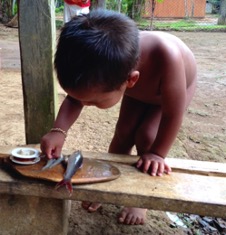RECONFIGURATE THE NOTIONS OF CHILDHOOD AND EARLY EDUCATION FROM THE PERSPECTIVE OF THE INDIGENOUS PEDAGOGIES OF SOME AMAZONIAN GROUPS
Abstract
This article invites us to rethink early education practices in historically contextualized, politically demystified, and ethically reflexive ways. It intends to review the meaning and praxis in early education, to sustain a dialogue aimed at recognition, respect, and draw inspiration from “pedagogies specific to ethnic groups” to compose methodologies and a configuration of childhood from a culturally situated perspective. This approach allows for addressing the integral development, exploration of the environment, expressiveness, and the construction of knowledge of boys and girls in early childhood. As a reference, the research I conducted in the Colombian Vaupés, specifically in Piramirí, a small
village located on the Cuduyarí River, a tributary of the Vaupés River, will be taken. There live the Pediküa, a Pãmiwa community, commonly called Cubeo in ethnographic and linguistic literature. Throughout several stays since 1993, I have been able to share parts of their daily life and hold a long conversation guided mainly by women. My focus has been on the childhood of the Pãmiwa. The guiding questions in the fieldwork over the
years have revolved around how children are conceived, what their socialization process is, how they are cared for, taught, and how they learn. I am particularly interested in examining the answers to these questions concerning the private or state incursions into childcare and education.
KEYWORDS: Indigenous childhoods. Early education. Pãmiwa’s pedagogies.
Downloads

Downloads
Published
Issue
Section
License
- Autores mantém os direitos autorais e concedem à revista o direito de primeira publicação, com o trabalho simultaneamente licenciado sob a Licença Creative Commons Attribution que permite o compartilhamento do trabalho com reconhecimento da autoria e publicação inicial nesta revista.
- Autores têm autorização para assumir contratos adicionais separadamente, para distribuição não-exclusiva da versão do trabalho publicada nesta revista (ex.: publicar em repositório institucional ou como capítulo de livro), com reconhecimento de autoria e publicação inicial nesta revista.
- Autores têm permissão e são estimulados a publicar e distribuir seu trabalho online (ex.: em repositórios institucionais ou na sua página pessoal) a qualquer ponto antes ou durante o processo editorial, já que isso pode gerar alterações produtivas, bem como aumentar o impacto e a citação do trabalho publicado (Veja O Efeito do Acesso Livre).


